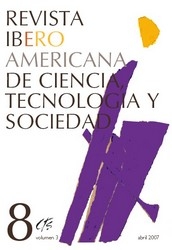Avaliação, Transparência e Democracia
DOI:
https://doi.org/10.52712/issn.1850-0013-952Palavras-chave:
ciência, sistemas de arbitragem, avaliação por pares, democraciaResumo
A responsabilidade individual do cientista diminuiu, em parte, devido à organização da ciência no século XX. O caráter social da ciência e a responsabilidade que isso acarretou podem ser compreendidos por meio da análise do sistema de arbitragem por pares. Neste artigo, a autora investiga a articulação desse sistema para revelar seus mecanismos fundamentais e propor alternativas de avaliação mais abertas.
Downloads
Referências
FULLER, Steve (2002): Knowledge Management Foundations, Boston-Oxford, Butterworth Heinemann.
GIBBONS, Michael , et al (1994): The New Production of Knowledge, Londres, Sage.
LENOIR, Timothy, HAYS, Marguerite (2000): “The Manhattan Project for Biomedicina”, en Sloan, Phillip (ed.)
PÉREZ SEDEÑO, Eulalia (2006): “Objetividad, evaluación por pares y valores”, en J.F. Álvarez y R. Rodríguez Aramayo (eds.) Disenso e incertidumbre. Un homenaje a Javier Muguerza, Madrid, CSIC-Plaza y Valdés.
SLOAN, Phillip [ed.] (2000): Controlling Our Destinies: Historical, Philosophical, Ethical, and Theological Perspectives on the Human Genome Project, University of Notre Dame Press.
WENERAS, Christine, WOLD, Agnes (1997): “Sexism and nepotism in peer review”, Nature, 387, pp. 321-343.
WENERAS, Christine, WOLD, Agnes (1999): “Bias and peer review of research proposals”, en Smith, J. y Smith, R. (eds.), Peer Review in Health Care, British Medical Journal Publishing, pp. 77-87.
ZIMAN, John (2000): Real Science, Cambridge University Press. Traducción español: La ciencia tal cual es (2002): Madrid, CUP-Iberia.
Downloads
Publicado
Como Citar
Edição
Seção
Licença
Copyright (c) 2025 CC Attribution 4.0

Este trabalho está licenciado sob uma licença Creative Commons Attribution 4.0 International License.
Todas os números de CTS e seus artigos individuais estão sob uma licença CC-BY.
Desde 2007, a CTS proporciona acesso livre, aberto e gratuito a todos seus conteúdos, incluídos o arquivo completo da edição quadrimestral e os diversos produtos apresentados na plataforma eletrônica. Esta decisão é baseada no entendimento de que fornecer acesso livre aos materiais publicados ajuda a ter uma maior e melhor troca de conhecimentos.
Por sua vez, em se tratando da edição quadrimestral, a revista permite aos repositórios institucionais e temáticos, bem como aos sites pessoais, o autoarquivo dos artigos na versão post-print ou versão editorial, logo após da publicação da versão definitiva de cada número e sob a condição de incorporar ao autoarquivo um link direcionado à fonte original.











